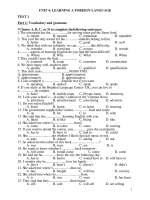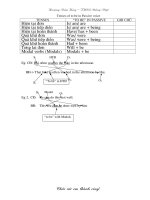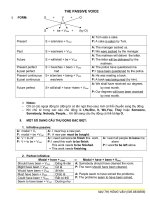BT PASSIVE VOICE -E12-UNIT 4
Bạn đang xem bản rút gọn của tài liệu. Xem và tải ngay bản đầy đủ của tài liệu tại đây (58.54 KB, 7 trang )
PASSIVE VOICE
1. Form
Active: S + V + O + …….
Passive: S + be + V3/ed + (by O) + ……
Ex: Active: She arranges the books on the shelves every weekend.
S V O
Passive: The books are arranged on the shelves (by her) every weekend.
S be V3/ed by O
2. Rules Khi đổi từ chủ động sang bò động, ta chú ý các bước sau:
a. Xác đònh S (Chủ từ), V (Động từ), O (Túc từ) và thì của động từ trong
câu chủ động.
Ex: Active: She arranges the books on the shelves every weekend.
S V1 O
b. Đem O lên làm S, chuyển S xuống làm O đặt sau by.
Ex: (P) The books are arranged on the shelves (by her) every weekend.
S by O
c. Thêm động từ to be (phù hợp với thì của động từ trong câu chủ động),
và chuyển động từ chính sang V3/ed.
Ex: (P) The books are arranged on the shelves (by her) every weekend.
be V3/ed
3. Notes:
a. Trong trường hợp có liên từ and và giới từ of, ta phải xác đònh đầy đủ
chủ từ hoặc túc từ khi chuyển đổi.
Ex:- Active: He and I see the film
Passive: The film is seen by him and me.
- Active: He bought a box of chocolates last week
Passive: A box of chocolates was bought last week.
b. Trong câu bò động: by O luôn đứng sau adverbs of place (trạng từ chỉ
nơi chốn) và trước adverbs of time (trạng từ chỉ thời gian).
Ex: (P) The books are arranged on the shelves (by her) every weekend.
adv of place by O adv of time
c. Trong câu bò động, ta có thể bỏ: by people, by us, by them, by
someone….
Ex: Passive: A new bridge has been built across the river (by them).
d. Trong caực thỡ coự caực trụù ủoọng tửứ (Auxiliary verbs) nhử: am/ is/ are, was/
were, has/ have, had
Active: S + Aux + V + O + .
Passive: S + Aux + be + V3/ed + (by O) +
Ex: - Active: They have built a new bridge across the river.
S Aux V O
Passive: A new bridge has been built across the river (by them).
S Aux be V3 by O
- Active: Mai was watching a cartoon at 8 oclock last night.
S Aux V O
Passive: A cartoon was being watched by Mai at 8 oclock last night.
S Aux be V-ed by O
Active Passive
S + V1 + O S + am/is/are + V3/ed
S + am/is/are + V-ing + O S + am/is/are + being +V3/ed
S + has/have + V3/ed + O S + has/have + been + V3/ed
S + V2/ed + O S + was/were +V3/ed
S + was/were + V-ing + O S + was/were + being +V3/ed
S + had + V3/ed + O S + had + been + V3/ed
S + will/shall + Vo + O S + will/shall + be +V3/ed
---------------------------------------------------------------------------------------------
EXERCISES (PASSIVE VOICE)
I/ Change these sentences into the passive voice
1. Somebody has robbed the bank near our house.
...
2. Somebody told me to wait outside.
...
3. Somebody has driven them to the airport.
...
4. They will complete the new high way from north to south next year.
...
5. My aunt made this sweater for her son.
...
6. The television station has broadcast all the 22
nd
Sea-Games competitions.
…………………………………………………….…………………………..
7. My teacher asked me to be here at 10 am.
…………………………………………………….…………………………..
9. Thomas Edison invented the electric light bulb.
…………………………………………………….…………………………..
10. She makes coffee for her parents every day.
…………………………………………………….…………………………..
II/ Put the verbs in parentheses into the correct active or passive voice
1. Last night my favorite program________________ (interrupt) by a special
news bulletin.
2. When I______________ (arrive) at the airport yesterday,
I______________ (meet) by my cousin and a couple of friends.
3. Kim______________ (write) this composition last week. That one
_____________ (write) by Phi.
4. I don’t have my bicycle today. It’s with the repairman. It______________
(repair) right now.
5. Someone has bought the small lot behind my house and a new
house_______________ (build) on it next year.
6. A: Do you understand the explanation in the book?
B: No, I don’t. I_______________ (confuse).
7. A: When____________ your bike_______________ (steal)?
B: Two days ago.
8. A:__________ you_____________ (pay) your electricity yet?
B: No. I haven’t. but I’d better pay it today. If I don’t, my electricity
supply ______________ (shut off) by the power company.
9. A: Did you hear about the accident?
B: No. What________________ (happen)?
A: A bicyclist_____________ (hit) by a taxi in front of the dorm.
B: ___________ the bicyclist______________ (injure)?
A: Yes. He_______________ (take) to City Hospital.
10. The Eiffel Tower_____________ (be) in Paris, France. It_____________
(visit) by millions of people every year. It_______________ (design) by
Alexandre Eiffel (1832-1923). It_______________ (erect) in 1889 for the
Paris exposition. Since that time, it_______________ (be) the most famous
landmark in Paris. Today it______________ (recognize) by people
throughout the world.
PASSIVE OF MODAL VERBS + EXERCISES
Passive Voice of Modal Verbs
Caực ủoọng tửứ khieỏm khuyeỏt (Modal verbs) nhử: can, could, will, would,
shall, should, may, might, must, had better, would rather, have to, be going
to, used to, ought to, .
Active: S + Modal Verbs + Vo + O + .
Passive: S + Modal Verbs + be + V3/ed + (by O) +
Ex: - Active: Nam can do this exercise right now.
S M.V Vo O
Passive: This exercise can be done by Nam right now.
S M.V be V3 by O
- Active: People are going to solve the problem next month.
S modal verb Vo O
Passive: The problem is going to be solved (by people) next month.
S modal verb be V-ed by O
EXERCISES
Change these sentences into the passive voice
1. People should send their complaints to the main office.
...
2. Somebody might steal your car if you had left the keys in it.
...
3. A short circuit could cause the fire.
...
4. Lan is going to invite her friends to her birthday party.
...
5. Lien couldnt open the door of the classroom.
...
6. They should announce that news as soon as possible.
...
7. Phong has to return the scientific book to the library.
...
8. People must repair that old building.
...
9. The government will rebuild the memorial monument.
...
10. The students may elect Phong their leader.
…………………………………………………………….…………………..
11. The teacher won’t accept papers written in pencils.
…………………………………………………………….…………………..
12. The athletes might visit some interesting places after Sea-Games.
…………………………………………………………….…………………..
13. Lan’s parents have to clean up their house before Tet holidays.
…………………………………………………………….…………………..
14. The principal might interview her.
…………………………………………………………….…………………..
15. They must keep fruit in the fridge for long.
…………………………………………………………….…………………..
--------------------------------------------------------------------------------------------
SPECIAL PASSIVE VOICE + EXERCISES
I. Thể bò động của câu phủ đònh và nghi vấn:
Ex: - (A) Mai doesn’t write this letter.
(P) This letter isn’t written by Mai.
- (A) They didn’t watch the fashion show last night.
(P) The fashion show wasn’t watched last night.
- (A) Did your father make this chair?
(P) Was this chair made by your father?
- (A) Who repaired your bicycle?
(P) Whom was your bicycle repaired by?
(By whom was your bicycle repaired?)
- (A) What plays did Shakespeare write?
(P) What plays were written by Shakespeare?
II. Động từ có hai túc từ:
1. Động từ cần giới từ TO: give, lend, send, show, …
Ex: - (A) John will give me this book. (=John will give this book to me.)
(P1) I will be given this book by John.
(P2) This book will be given to me by John.
2. Động từ cần giới từ FOR: buy, make, get, …
Ex: - (A) He bought her a rose. (=He bought a rose for her.)
(P1) She was bought a rose.
(P2) A rose was bought for her.









